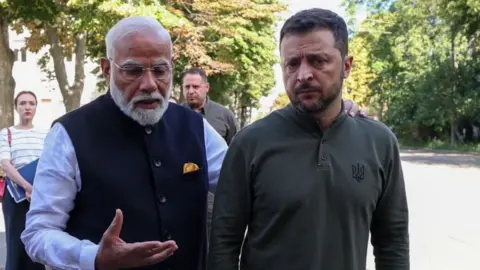 that I
that IIndian Prime Minister Narendra Modi has arrived in Ukraine for talks with President Volodymyr Zelensky. The visit comes just weeks after he met Russian President Vladimir Putin in Moscow.
The visit is of great importance because Kiev and some Western capitals reacted sharply to Mr. Modi’s visit to the Russian capital In July.
Zelensky was particularly critical, saying he was “disappointed to see the leader of the world’s largest democracy hugging the world’s most bloodthirsty criminal in Moscow.”
Is Mr Modi visiting Kyiv to appease Mr Zelensky and other Western leaders?
not quite.
It is not surprising to see India balancing its relations between two competing countries or blocs. The country’s famously non-aligned approach to geopolitics has served it well for decades.
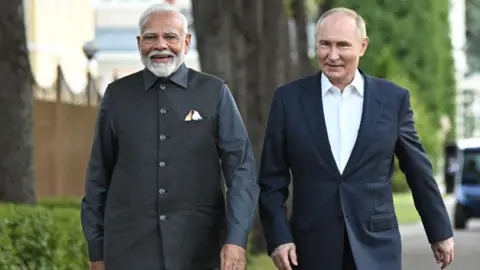 Getty Images
Getty ImagesFriday’s visit – the first by an Indian prime minister to Ukraine – is more about signaling that while India will continue to have strong ties with Russia, it will still work closely with the West.
The trip will reaffirm India’s strategic independence, said Michael Kugelman, director of the South Asia Institute at the Wilson Center, a Washington think tank.
“India is not seeking to appease Western powers, or anyone else,” he says. “Rather, it is a trip aimed at advancing Indian interests, by reaffirming friendship with Kiev and conveying its concerns about the ongoing war.”
However, the timing of the visit reflects that Indian diplomats took into account the sharp reactions from the United States to Mr. Modi’s visit to Moscow.
India has Refrain from criticizing Russia directly. During the war, which alarmed the Western powers.
However, New Delhi has repeatedly spoken of the importance of respecting the territorial integrity and sovereignty of states, and has consistently pushed for diplomacy and dialogue to end the war.
Mr Modi’s visit to Moscow in July came hours after Russian shelling killed at least 41 people in Ukraine, including a children’s hospital in Kyiv, sparking global outrage.
The Indian prime minister said the children’s deaths were painful and horrific but stopped short of blaming Russia.
Mr Modi is unlikely to deviate from this position during his visit to Kiev. The United States and other Western countries have come to accept New Delhi’s position, given India’s tested relationship with Moscow and its reliance on Russian military equipment.
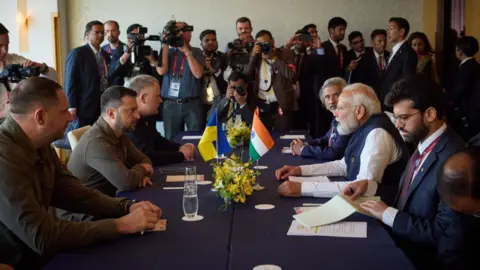 Getty Images
Getty ImagesIndia, the world’s largest arms importer, has diversified its defence import portfolio and developed domestic manufacturing in recent years but still buys more than 50% of its defence equipment from Russia.
India has also increased its oil imports from Russia, taking advantage of cheaper prices offered by Moscow, as Russia was the largest oil supplier to India last year.
The United States and its allies have often urged India to take a clearer stance on the war, but have also refrained from imposing harsh sanctions or pressure.
The West also sees India as a counterweight to China and does not want to upset that dynamic. India, now the world’s fifth-largest economy, is also a growing business market.
Mr Kugelman says the West will welcome the visit and see it as a willingness by Delhi to engage with all sides.
“Mr Modi has a strong incentive to suggest that India is not getting so close to Moscow that there is nothing to salvage with Kiev,” he says.
This is important because India wants to continue to grow its relations with the West, especially the United States, and does not want to disrupt that momentum. Eric Garcetti, the US ambassador to India, recently said that the relationship should not be “taken for granted.”
India also needs the West, given the close ties that its Asian rival China has built with Russia in recent years.
Although New Delhi has long viewed Moscow as a power capable of exerting pressure on China when needed, this cannot be taken lightly.
At the same time, many media commentators have spoken of the possibility that Mr Modi could present himself as a peacemaker, given India’s close ties with both Moscow and the West.
But he is unlikely to come up with a peace plan.
“Is India really ready for this, and are the conditions right? India doesn’t like other countries trying to mediate its own issues, most notably Kashmir. I don’t think Mr. Modi will formally offer to mediate unless Russia and Ukraine want to. And at this point, I don’t think they want to,” Kugelman added.
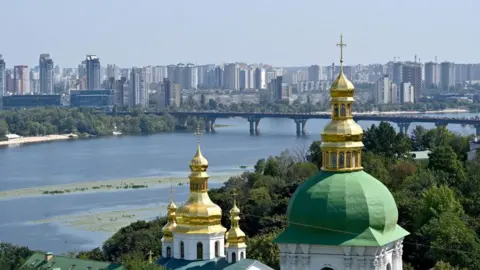 Getty Images
Getty ImagesHowever, Ukraine will still welcome Mr. Modi’s visit and view it as an opportunity to reach out to a close ally of Moscow, something it has not done much of since the war began.
But Zelensky is unlikely to hold back his criticism of Putin in front of the Indian prime minister. Modi can take this, as he has faced such situations many times in other Western capitals.
Moscow is unlikely to react to the visit, as it has made concessions to New Delhi’s multilateral approach to geopolitics.
But besides reaffirming its policy of non-alignment, Delhi has bigger goals for this visit.
India has been intensifying its engagement with Europe over the past decade, especially with underserved regions of Central and Eastern Europe.
New Delhi wants to continue strengthening its ties with the big four countries — the UK, Italy, Germany and France — but also wants to boost engagement with other countries in Europe.
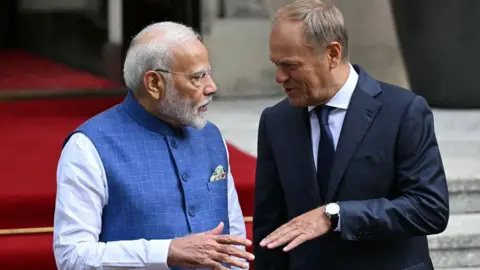 Getty Images
Getty ImagesMr Modi is also visiting Poland on this trip – the first Indian prime minister to visit the country in 45 years. He also became the first Indian prime minister to visit Austria in 41 years in July.
Analysts say this indicates a growing understanding on the part of India that Central European countries will play a greater role in geopolitics in the future, and that strong ties with them will serve Delhi well.
The Indian government has also revived negotiations on a trade agreement with Europe. It has signed a trade and investment agreement with the European Free Trade Association, an intergovernmental organization that includes Iceland, Liechtenstein, Norway and Switzerland.
Although the war will be a major focus during his visit, Indian diplomats are likely to remain focused on the larger goal.
“Central and Eastern European countries now have greater power to write their own destiny and reshape regional geopolitics. Mr. Modi’s visit to Warsaw and Kiev is about recognizing this sea change at the heart of Europe and deepening bilateral political, economic and security ties with Central European countries,” wrote political analyst C. Raja Mohan in The Hill. Indian Express A newspaper that sums up Mr Modi’s broader goal.

“Unapologetic tv specialist. Hardcore zombie trailblazer. Infuriatingly humble problem solver.”






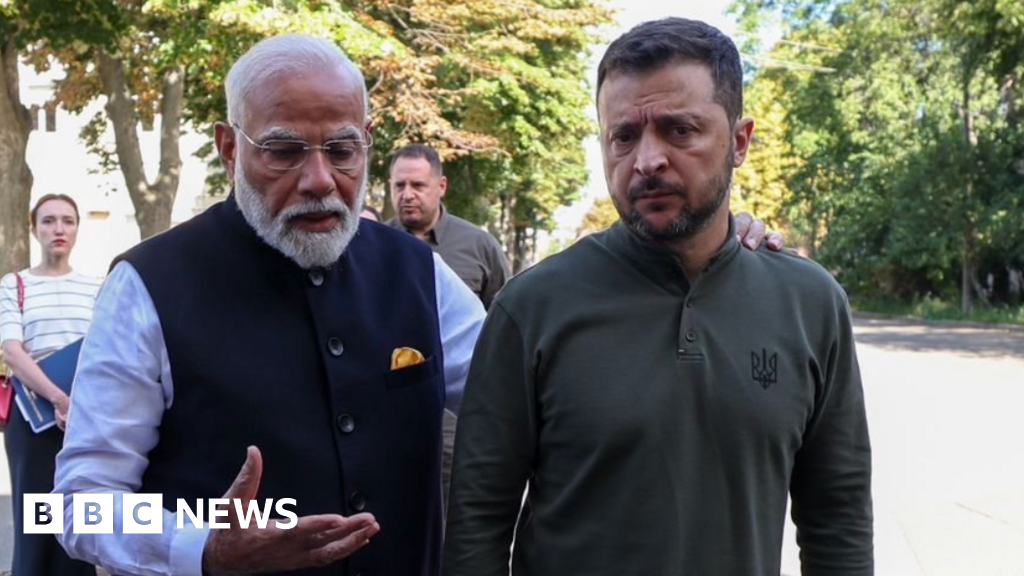

More Stories
Stand News editors convicted in sedition case
Latest Baysail sinking: Mike Lynch’s wife ‘didn’t want to leave boat without family’ as crew investigated
WFP halts Gaza operations after repeated shooting at aid vehicle